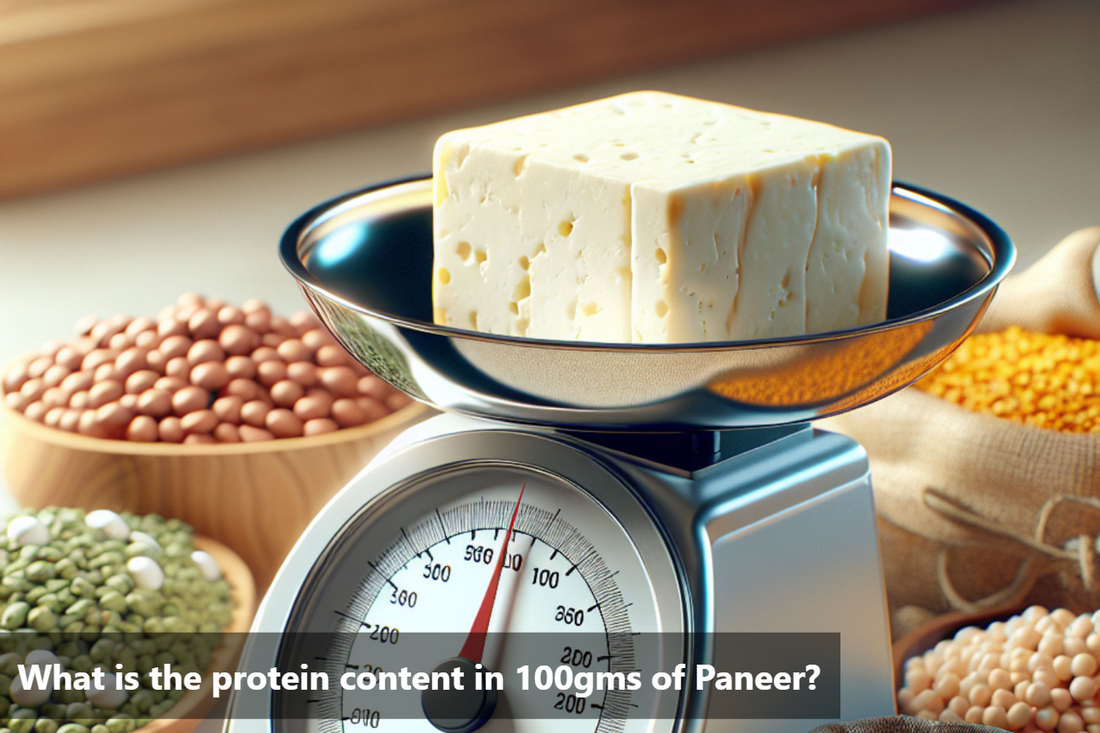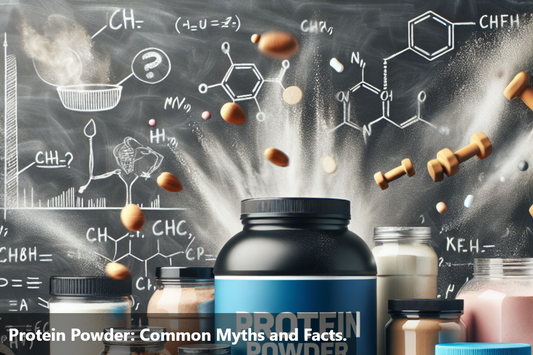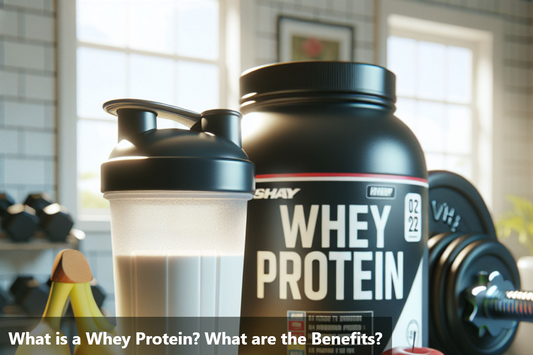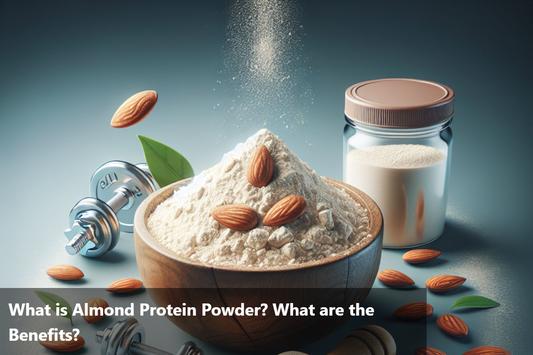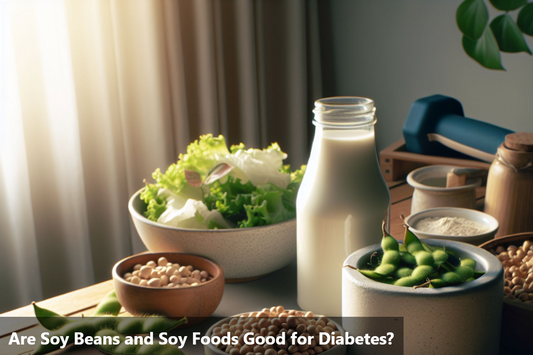Paneer, Indian cottage cheese, is a versatile dairy product commonly used in Indian cooking. Paneer is loved for its soft, crumbly texture and its ability to soak up flavors, making it a popular option for various dishes.
In Indian cuisine, paneer is an important ingredient in both vegetarian and non-vegetarian meals, adding richness and protein. What makes paneer special is its high protein content, which makes it a great addition to diets focused on protein.
With around 18 grams of protein per 100 grams, paneer provides a good protein boost, helping with muscle growth and repair. Whether you want to increase your protein intake or try new recipes, adding paneer to your meals can be a tasty and healthy choice.
Nutritional Composition of Paneer
100 grams of paneer contains:
|
Nutrient |
Amount per 100g |
|---|---|
|
Energy |
321 Kcal |
|
Protein |
25 g |
|
Total fat |
25 g |
|
Dietary fiber |
0 |
|
Carbohydrates |
3.57 g |
|
Sugar |
3.57 g |
|
Calcium |
407 mg |
|
Potassium |
71 mg |
|
Sodium |
18 mg |
|
Saturated fat |
17.9 g |
|
Trans fat |
0 |
|
Cholesterol |
89 mg |
Benefits for health
-
In a 100g serving of paneer, you can typically find around 18-25 grams of protein, making it a substantial protein source for vegetarians and those looking to increase their protein intake without meat.
-
This protein content is comparable to that of chicken breast or tofu, making paneer a versatile option for individuals following different dietary preferences.
-
Including paneer in your diet can be beneficial for meeting your daily protein requirements, especially if you are following a vegetarian or high-protein diet.
-
Its protein content not only aids in muscle building and repair but also helps with weight management by promoting satiety and reducing cravings for unhealthy snacks.
-
When planning your meals, consider incorporating paneer in various dishes like curries, salads, or wraps to enhance the protein content and add a delicious twist to your diet.
-
By including paneer strategically, you can ensure a well-rounded and nutritious diet that supports your health and fitness goals.
-
For those looking to increase their protein consumption, paneer can serve as a satisfying post-workout snack. Its protein content aids in muscle recovery and repair, making it an ideal choice for fitness enthusiasts.
Simple recipes incorporating Paneer in daily diet
Paneer Tikka:
-
Cut paneer into cubes and marinate them with yogurt, ginger-garlic paste, red chili powder, turmeric powder, garam masala, and salt.
-
Thread the paneer cubes onto skewers along with bell peppers, onions, and tomatoes.
-
Grill or bake until the paneer is lightly charred and cooked through. Serve hot with mint chutney.
Paneer Bhurji:
-
Crumble paneer and keep it aside.
-
Heat oil in a pan, add cumin seeds, chopped onions, ginger, and green chilies. Sauté until onions turn golden brown.
-
Add chopped tomatoes, turmeric powder, red chili powder, and salt. Cook until tomatoes are soft.
-
Add crumbled paneer and cook for a few more minutes until everything is well combined. Garnish with chopped coriander leaves and serve hot with roti or bread.
Palak Paneer (Spinach Paneer):
-
Blanch spinach leaves and blend them into a smooth puree.
-
Heat oil in a pan, add cumin seeds, chopped onions, and ginger-garlic paste. Sauté until onions are translucent.
-
Add the spinach puree, turmeric powder, garam masala, and salt. Cook for a few minutes.
-
Add cubed paneer and cook until heated through. Finish with a dollop of cream (optional) and serve hot with rice or naan.
Paneer Pulao:
-
Heat ghee in a pan, add whole spices (like cloves, cinnamon, and cardamom), and sauté for a minute.
-
Add sliced onions and green chilies. Sauté until onions turn translucent.
-
Add washed basmati rice, water, salt, and cubed paneer. Cook until the rice is done and all the water is absorbed.
-
Garnish with chopped coriander leaves and serve hot with raita or any curry of your choice.
Estimating Protein in Paneer
The protein content in 100 grams of paneer plays a significant role in promoting a healthy diet rich in essential nutrients. Rich in protein, paneer is a favorite among health enthusiasts and fitness buffs looking to meet their daily protein requirements. It is also one of the rich sources of protein in the vegetarian diet. The protein in paneer is not only essential for muscle growth and repair but also helps in keeping you feeling full and satisfied for longer durations.
Moreover, paneer is also a good source of calcium, a crucial mineral for maintaining strong bones and teeth. This makes it an excellent choice for individuals looking to boost their calcium intake without consuming dairy products like milk.
So next time you're planning your meals, consider incorporating paneer into your diet to not only enjoy its delicious taste but also reap the numerous health benefits it has to offer.
DiabeSmart is the first food range exclusively crafted for diabetics. Enjoy clinically tested, delicious products that let you keep your favorite food habits while managing your blood sugar levels effortlessly.
This Blog post is an initiative by DiabeSmart, to provide accurate and Nutritionist / Doctor approved information related to Diabetes. DiabeSmart is India's first Food brand designed specifically for Diabetics, that has been clinically tested on Diabetics and Pre-Diabetics to deliver 55% - 70% lower Sugar spikes. DiabeSmart is part of Lo! Foods - India's leading brand for Everyday Functional Health foods.

